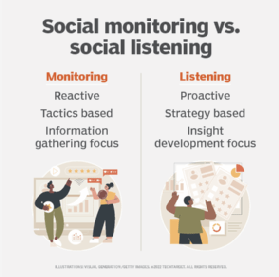social CRM
What is social CRM?
Social CRM, or social customer relationship management, is customer relationship management (CRM) and engagement fostered by communication with customers through social networking sites such as Twitter and Facebook.
Social CRM integrates social media platforms with CRM systems to provide insight into customer interactions with a brand and improve customer engagement quality.
Traditional vs. social CRM
Social CRM provides different benefits from traditional CRM in that it targets prospective customers through social media platforms and provides more convenient customer service as well as a more personalized marketing strategy.

It's also important to note that traditional CRM centers around collecting and managing current customer data. Traditional CRM uses direct advertising to boost sales, collects customer data to target campaigns at specific consumers and aims to retain current customers. In addition, customer service is often automated, and customers share their experiences through word of mouth.
Social CRM is more of a strategy for customer engagement. Social CRM tracks sales communications between customers and businesses, but it also tracks interactions via social media and review platforms. It helps create a pathway to potential customers, provides fast customer service through a consumer's preferred social media platform and enables customers to share their experiences with millions online.
Social CRM metrics
Social CRM tools use the following metrics to measure the level of successful customer engagement:
- Traffic. Social CRM measures traffic and conversion rates from social media platforms. This enables businesses to see how many customers visit sites and how those clicks convert into value.
- Engagement. Social CRM enables businesses to measure not just clicks, but user engagement with the sites.
- Level of followers. Social CRM helps identify active followers and how they do or do not interact with the company's content.
- Brand mentions. Social CRM helps measure how many followers are talking about a company or brand and if those customers are sharing their experiences via social media platforms.
Examples and benefits of social CRM
Companies rely on social CRM to collect data on customers, engage with new customers and build customer loyalty. Customers can be categorized based on their buying needs, habits and purchase history, as well as their feedback on products and services, which enables companies to provide personalized customer service.
Here are some examples of social CRM in action, as well as its benefits:
- A business -- or even a customer -- creates a fan page for the company or product on Facebook. People who like the brand and the way it conducts business will sign up as fans, creating a venue for communication, marketing and networking.
- A business can quickly get information out to users who are interested in the company or its products.
- A business can follow conversations about its brand for real-time market data and feedback.
- A customer can easily tell a company -- and everyone else -- about their experiences with the company, whether those experiences are good or bad.
- Using social media monitoring tools, a business can respond very quickly to negative feedback; attend to customer problems; and maintain, regain or rebuild customer confidence.
- A customer can use social networking sites to offer ideas for future products or tweaks to current ones.






